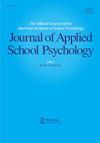School-Related Social Support as a Buffer to Stressors in the Development of Adolescent Life Satisfaction
IF 1.5
Q4 PSYCHOLOGY, EDUCATIONAL
引用次数: 2
Abstract
Abstract Adolescents who report high levels of satisfaction with their life tend to have better grades in school, fewer behavior problems, and positive long-term outcomes. For this reason, there is a growing interest in understanding how schools can promote life satisfaction. In this study, we examined how social support for learning (i.e., support provided by families, teachers, and peers related to learning) relates to adolescent life satisfaction. Further, we tested how this type of social support moderates the effect of stressful life events as a predictor of adolescent life satisfaction cross-sectionally and over a 6-month period. Cross sectional analyses revealed that peer, teacher, and family social support for learning had a small, but significant, association with life satisfaction (beta-weights between 0.10 and 0.21) and that peer support significantly moderated stressful life events (β = −.035). After a 6-month period, family support for learning was observed to have a significant main effect (β = .187) and moderated life stress (β = −0.109); but no other significant effects were observed. The results of this study suggest that social support for learning may be one malleable construct schools consider assessing to understand school-factors that influence student life satisfaction. In addition, schools may consider interventions that target family social support for learning, especially for students experiencing significant life stressors as one way to promote life satisfaction.学校相关社会支持在青少年生活满意度发展中的缓冲作用
摘要报告对生活满意度高的青少年往往在学校成绩更好,行为问题更少,长期结果积极。因此,人们对了解学校如何提高生活满意度越来越感兴趣。在这项研究中,我们考察了学习的社会支持(即家庭、教师和与学习相关的同龄人提供的支持)与青少年生活满意度的关系。此外,我们测试了这种类型的社会支持如何在6个月的时间里调节压力生活事件作为青少年生活满意度的预测指标的影响。横断面分析显示,同伴、教师和家庭对学习的社会支持与生活满意度有很小但显著的相关性(β权重在0.10和0.21之间),同伴支持显著调节了压力性生活事件(β=−.035)。6个月后,家庭对学习的支持具有显著的主要影响(β=.187)和缓和的生活压力(β=-0.109);但未观察到其他显著影响。这项研究的结果表明,对学习的社会支持可能是学校考虑评估的一个可塑性结构,以了解影响学生生活满意度的学校因素。此外,学校可以考虑采取针对家庭社会支持学习的干预措施,特别是针对经历重大生活压力的学生,以此作为提高生活满意度的一种方式。
本文章由计算机程序翻译,如有差异,请以英文原文为准。
求助全文
约1分钟内获得全文
求助全文
来源期刊

Journal of Applied School Psychology
PSYCHOLOGY, EDUCATIONAL-
CiteScore
2.40
自引率
10.00%
发文量
7
期刊介绍:
With a new publisher (Taylor & Francis) and a new editor (David L. Wodrich), the Journal of Applied School Psychology will continue to publish articles and periodic thematic issues in 2009. Each submission should rest on either solid theoretical or empirical support and provide information that can be used in applied school settings, related educational systems, or community locations in which practitioners work. Manuscripts appropriate for publication in the journal will reflect psychological applications that pertain to individual students, groups of students, teachers, parents, and administrators. The journal also seeks, over time, novel and creative ways in which to disseminate information about practically sound and empirically supported school psychology practice.
 求助内容:
求助内容: 应助结果提醒方式:
应助结果提醒方式:


